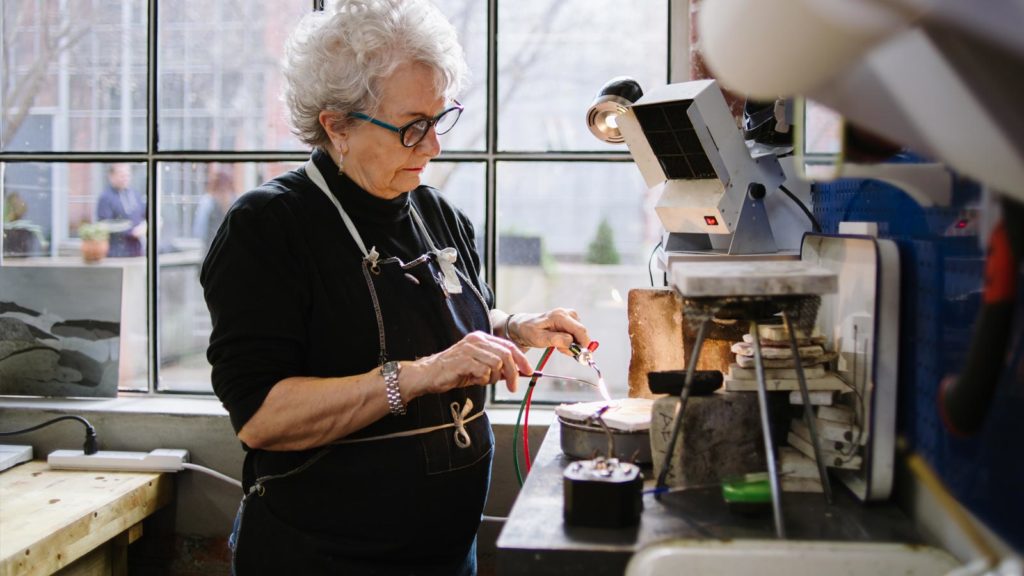Project Overview
Supporting Healthy Ageing at Work (SHAW) is a 3-year study in which we will work with employers, employees, professional bodies and other key stakeholders, to deepen our understanding of how work and health are intertwined in older workers’ everyday lives. The aim of the study is to design innovative workplace interventions to support the health and well-being of older workers (aged 50+). There is an urgent need to make the health of older workers more visible. One in three workers in the UK are aged 50+, and this figure is set to rise in coming decades. Forty-four percent of people aged 50-64 have a long-term health condition, and 21% of older workers who leave the workforce before State Pension Age cite health problems as the primary reason for leaving.
New research is urgently needed to identify the most appropriate actions employers can take to prevent health conditions from developing in their older workforce, and to support older employees who have existing health problems. It is important to fill these gaps in our understanding because, with the right workplace supports in place, older people are more likely to be able to extend their working lives even if they experience long-term health issues. This urgency has been heightened by the Covid-19 pandemic as both older workers and their employers reassess health needs and risks associated with older age, and consider alternative forms of working.
We will gain an in-depth understanding of the health needs of older workers through our participant interviews throughout autumn and winter of 2021/22. As an interdisciplinary, mixed-methods study, we also draw on large quantitative household survey datasets for statistical evidence on health and later-life work. Throughout 2022, we will use a co-design approach to involve a proportion of our study participants in the development and testing of a range of workplace health interventions. Towards the end of 2022, throughout 2023 and early 2024, we will work with a range of industry partners to promote widespread adoption of these interventions, to help older workers to stay in paid work for longer should they wish, and improve their overall well-being.
The potential impact of this work will be significant. Our aim is to encourage increased industry investment in healthy ageing at work, allow employers to retain older workers’ knowledge and talent, and support people to remain active, economically productive, independent, and socially connected across generations for longer. Ultimately, these outcomes will contribute to narrowing the gap between the richest and poorest and ensure people enjoy at least five extra healthy, independent years by 2035.
Engagement with older people
We know that the onset of health problems becomes more common among people in their 50s – almost half of those aged 50-64 have at least one long-term health condition. For many older workers, health conditions and concerns are the main reason for leaving their job, often before they want to or can afford to. Evidence suggests that, with the right workplace supports in place, older people with long-term health issues are more likely to be able to remain in work. Through qualitative semi-structured interviews, this project will engage with older people in employment to ask them about their health at work, how they are currently supported by their employer, and crucially what workplace initiatives they feel would support healthy ageing at work. In addition to engaging with older people through an in-depth exploration of their views and experiences of how their work and their health are intertwined, the research will also adopt a co-design approach to involve older workers in the development and testing of a range of innovative workplace interventions to improve the health, well-being and financial stability of workers in later life.
We are collaborating with case study organisations in the finance, manufacturing and social care sectors. We will work with employees aged 50+ within these organisations to explore the sorts of health issues that they face. We are particularly interested in older workers’ experiences of ‘hidden health’ issues that tend to be overlooked in workplace health interventions – for example, menopause, cognitive ageing and decline, financial well-being, and the health needs of informal carers. We will also work with a group of older self-employed workers, exploring the same themes.
Working with business
In addition to our collaboration with three case study organisations, we anticipate translation and adoption of our workplace interventions across a broad range of employers. We will collaborate with companies who are already designing health and well-being products, to ensure that they are fit for purpose for older workers and their diverse health needs. Several companies have expressed early interest in partnering with us to support scale-up and employer/employee adoption. In 2023-2024, we will host four knowledge exchange events for employers to publicise the research and showcase our interventions and products in different regions of the UK, specifically targeting a range of employer types and sizes.
The potential impact of successfully engaging with older people within with organisational contexts will be significant. Working with business to better support older workers will allow employers to retain experienced staff and avoid the financial and time costs of replacing them. Increased industry investment in healthy ageing at work through the adoption of workplace health interventions will help to increase productivity, build resilience and sustainability within the ageing workforce, and create new market opportunities to promote economic growth.
We acknowledge that many ‘workers’ in the UK are self-employed. As such, we plan to interview a broad range older self-employed workers including sole-traders, contractors, entrepreneurs and individuals working within the gig economy. We understand that self-employed older workers will not have access to organisational support in the same way as employees. To better understand this distinction, we will invite our interview participants to engage in specialised facilitated workshops to understand the support needs and challenges of the self-employed that differ from employees working within our three case study organisations.
Diversity and environments of ageing
The SHAW project considers workers aged 50+ as a highly heterogeneous group of individuals. We will work to reduce the current lack of visibility that is experienced by the over 50s, where they can be treated as one homogenous group in government policy, academic studies as well as organisational initiatives. This ‘segment’ of the working population spans a broad range of ages (50-75+); it is further differentiated by sex, class, ethnicity, occupational type, skills, and a wide array of domestic and life circumstances. All of these are social determinants of health that contribute to health inequalities among older people. A more nuanced understanding of older workers’ health and well-being is urgently required to identify their needs and narrow the health gap between richest and poorest through developing more relevant interventions from mid-life onwards.
We know that the nature and quality of people’s work influences their health and well-being and that, conversely, people’s state of health influences their ability to work. What is less well understood is how the relationship between work and health changes over time as people grow older. The experiences and needs of older workers have tended to be overlooked in previous research about work and health and well-being. When older workers have been considered, not enough attention has been paid to inequalities between different groups. We know little about how older workers’ health and well-being is influenced by factors such as gender, ethnicity, social class, occupation, type of employment, and unpaid caring roles. Moreover, some aspects of health and well-being that particularly affect older workers, such as menopause, cognitive decline, and financial stability, are especially hidden.






